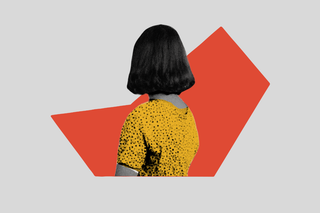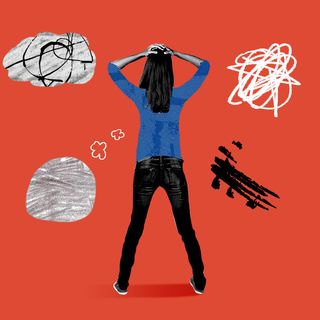
There’s a Lot More to ADHD Than Just a Lack of Focus
The true depths of ADHD’s impact can stretch far beyond a lack of focus, and beyond the flippant usage of the clinal diagnosis.

We’re beginning to hear the term “ADHD” — short for “Attention Deficit Hyperactivity Disorder,” a DSM-5 diagnosis indicating a form of neurodivergence — thrown around like confetti at a party. Mimicking the way, OCD — yet another clinical diagnosis, had become the choice term to describe a preference for cleanliness, ADHD has now become the buzzword du jour, a cool, hip label: “Oh, sorry, I can’t focus right now, I must have ADHD.” At times, it’s also used sarcastically, in a bid to diss at the diagnosis becoming more common among adults. Either way, it minimizes the struggles that shadow ADHD people in a world designed to cater to their neurotypical counterparts.
Often, both these lines of thought are motivated by the misconception that ADHD merely refers to an inability to focus — which, in the digital age, happens to be a rather common human experience; except that it’s actually even worse for ADHD individuals. The true depths of ADHD’s impact can stretch far beyond a lack of focus, and beyond the flippant usage of the clinical diagnosis.
“If you sometimes get distracted because of a notification from an app on your phone and then suddenly find yourself, many minutes later, still staring at the screen, you probably don’t have ADHD. What you have is an attention-seeking machine in your pocket that is designed to distract you and monopolize your gaze,” writes Samoon Ahmad, a clinical professor of psychiatry at the NYU Grossman School of Medicine. “[I]f you can’t stop looking at your phone, it’s only proof that you are susceptible to sophisticated technologies meant to hijack your attention — not evidence that you have ADHD.”
Indeed, in recent years, there has been an increase in ADHD diagnoses — with the prevalence of ADHD in adults increasing by 123%, and children by 26%, between 2007 and 2016. The popularity of the neurodiversity movement — that roots for society to see ADHD, among others, as a divergence from being neurotypical, and challenges society’s perception of what an ADHD person “looks” like — has led to increased awareness of ADHD-symptoms; mostly, by destigmatizing the ADHD-neutotype to a large extent. This growth in awareness — coupled with a greater willingness to seek help — has translated into more ADHD diagnoses. But that doesn’t mean “everyone has ADHD” or “most people are a little ADHD.”
Related on The Swaddle:
Why People Living With ADHD Are Often Misjudged As ‘Lazy’
In fact, the casual usage of ADHD to describe a momentary lack of focus has led to a kind of oversimplification of the experience that doesn’t just trvialize the strugges of ADHD people, but also perpetuates misconceptions about their neurotype. As psychologist Michael Zaccariello had explained to a concerned parent once, “[M]ost healthy people are occasionally inattentive, hyperactive or impulsive.” Yes, many ADHD people do deal with frequent bouts of severe inattention — two parameters that are assessed during the formal diagnosis process for ADHD — but that’s not all there is to it.
Moreover, as experts have begun to posit, “Rather than lack of focus, it might be more accurate to think of [ADHD] as a lack of control over what you focus on. The ADHD brain is always buzzing, always thinking about something. The problem is motivating it to focus on the thing that you need to get right done now.”
This lack of control over focus stems from impulsivity, yet another symptom of ADHD, alongside challenges with time management, which can hinder productivity and job performance. Further, the emotional dysregulation often associated with ADHD can strain personal relationships, causing misunderstandings and conflict. In addition, memory problems that ADHD people often experience, coupled with their struggles to initiate and complete tasks, can significantly impact their everyday life, too.
Cumulatively, living with these symptoms can result in reduced self-esteem, increased stress, and an overall decreased quality of life, especially since one is often denied accommodations allowing them to be on par with individuals born with neurotypical privilege — often, due to the same misconceptions that lead people to take ADHD lightly. Psychiatrist Alex Dimitriu wrote in 2021, “Many fail to understand that ADHD is far more than a benign condition simply challenging one’s learning and organizational skills… [U]nchecked, [ADHD] can prove literally dangerous, its victims pursued by their propensity for life-altering addictions, risky behaviors, and even suicide.”
Related on The Swaddle:
Unless one actually believes that this describes every single person they have crossed paths is, not everyone has ADHD. If one does believe that it describes them, though, it might be time to seek a diagnosis — since they’d have more to back it up with than a mere lack of focus.
However, this isn’t to say that only those with formal diagnoses of ADHD really struggle, while those with self-diagnoses are merely looking for a way to be “legitimately lazy.” Many ADHD people — especially those without a diagnosis — are, in fact, often misjudged as lazy due to their executive dysfunction, forcing them to internalize this ill-founded assessment over time and hate themselves for something they actually cannot help, while believing it to be their fault. It is true that with growing awareness around neurodivergence, things are changing, and more adults are getting diagnosed than ever before. But it is rather erroneous to believe that everyone can afford to undergo the comprehensive evaluation by a qualified healthcare professional that a formal diagnosis calls for.
This forces many individuals may rely on self-diagnosis for years — either to grasp their symptoms through the lens of their experiences, or a means to advocate for themselves and seek support. Instead of summarily diamissing individuals with self-diagnoses of neurodivergence, it is pertinent to help them seek professional guidance — if they do desire that — since a formal diagnosis isn’t just validating, but can also grant them access to treatments and accommodations tailored to their needs, helping their careers, relationships, and even their mental health.
The takeaway: ADHD isn’t a fancy catchphrase to sprinkle into conversations; it’s a real, complex condition that deserves our empathy and validation. And so, it is crucial to acknowledge the full range of symptoms associated with ADHD and understand the profound impact they can have on people’s lives — while simultaneously recognizing that not everyone has access to formal diagnoses.
Devrupa Rakshit is an Associate Editor at The Swaddle. She is a lawyer by education, a poet by accident, a painter by shaukh, and autistic by birth. You can find her on Instagram @devruparakshit.
Related


Why Some People Expect Catastrophes in Everyday Situations
